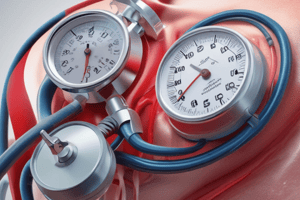Podcast
Questions and Answers
Which of the following lifestyle modifications is recommended to help manage stress and anxiety in individuals with hypertension?
Which of the following lifestyle modifications is recommended to help manage stress and anxiety in individuals with hypertension?
- Engaging in aerobic exercise
- Maintaining a healthy body weight
- Practicing relaxation techniques (correct)
- Limiting alcohol consumption
What is the primary foundation of hypertension management according to the text?
What is the primary foundation of hypertension management according to the text?
- Dietary changes (correct)
- Exercise
- Stress management
- Weight management
What is one of the key dietary recommendations for individuals with hypertension mentioned in the text?
What is one of the key dietary recommendations for individuals with hypertension mentioned in the text?
- Increasing saturated fat consumption
- Reducing sodium intake (correct)
- Eating more processed foods
- Consuming high amounts of alcohol
How often should individuals engage in aerobic exercise as part of hypertension management?
How often should individuals engage in aerobic exercise as part of hypertension management?
When lifestyle modifications alone are not enough to control blood pressure, what treatment option may be considered?
When lifestyle modifications alone are not enough to control blood pressure, what treatment option may be considered?
In terms of alcohol consumption, what are the recommended limits for men and women with hypertension?
In terms of alcohol consumption, what are the recommended limits for men and women with hypertension?
Which non-pharmacological intervention involves ablating nerves in the renal arteries to treat resistant hypertension?
Which non-pharmacological intervention involves ablating nerves in the renal arteries to treat resistant hypertension?
What is a common class of antihypertensive medication that includes examples like ramipril and lisinopril?
What is a common class of antihypertensive medication that includes examples like ramipril and lisinopril?
What type of medication includes examples like losartan and valsartan?
What type of medication includes examples like losartan and valsartan?
Which medication class is sometimes combined with calcium channel blockers or ARBs in combination medications?
Which medication class is sometimes combined with calcium channel blockers or ARBs in combination medications?
What procedure involves implanting a device to stimulate the baroreceptors in the carotid sinus for treating resistant hypertension?
What procedure involves implanting a device to stimulate the baroreceptors in the carotid sinus for treating resistant hypertension?
Which medical professionals may be part of a healthcare team for managing hypertension according to the text?
Which medical professionals may be part of a healthcare team for managing hypertension according to the text?
Flashcards are hidden until you start studying
Study Notes
Hypertension Treatment: Understanding Options and Approaches
Hypertension, or high blood pressure, is a chronic health condition that affects millions worldwide. Managing this condition is essential to prevent damage to vital organs and improve overall health outcomes. Treatment options range from lifestyle modifications to medication and, in some cases, interventions like surgical procedures.
Lifestyle Modifications
Lifestyle adjustments form the foundation of hypertension management, and they include:
- Dietary changes: Eat a balanced diet rich in fruits, vegetables, whole grains, and low-fat dairy products, while reducing consumption of processed foods, saturated fats, and sodium.
- Exercise: Engage in regular physical activity, such as walking, swimming, or other aerobic exercise, for at least 150 minutes per week.
- Weight management: Maintain a healthy body weight to reduce the strain on the cardiovascular system.
- Limit alcohol and avoid smoking: Limit alcohol consumption to no more than two drinks per day for men and one drink per day for women, and do not smoke.
- Stress management: Practice relaxation techniques to help manage stress and anxiety, as these can contribute to hypertension.
Pharmacological Therapies
When blood pressure cannot be adequately controlled through lifestyle modifications alone, medications may be prescribed. Typically, doctors will start with a single drug, such as an angiotensin-converting enzyme (ACE) inhibitor or a calcium channel blocker, and then gradually add additional medications if needed. Common classes of antihypertensive medications include:
- ACE inhibitors: Examples include ramipril and lisinopril.
- Angiotensin II receptor blockers (ARBs): Examples include losartan and valsartan.
- Calcium channel blockers: Examples include amlodipine and diltiazem.
- Thiazide diuretics: Examples include hydrochlorothiazide and indapamide.
- Beta-blockers: Examples include metoprolol and atenolol.
- Central agonists: Examples include clonidine and guanfacine.
- Alpha-blockers: Examples include doxazosin and tamsulosin.
- Combination medications: Examples include ACE inhibitors combined with calcium channel blockers or ARBs combined with calcium channel blockers.
Non-pharmacological Interventions
In some cases, non-pharmacological interventions may be considered, such as:
- Renal denervation: A procedure to treat resistant hypertension by ablating nerves in the renal arteries, thus disrupting the nerve impulses that regulate blood pressure.
- Baroreceptor therapy: A procedure to treat resistant hypertension by implanting a device that stimulates the baroreceptors in the carotid sinus, thus helping to regulate blood pressure.
Other Considerations
- Monitoring progress: Regularly check blood pressure and adjust treatment plans as needed to ensure optimal control.
- Treating underlying causes: Address any underlying medical conditions that may contribute to hypertension, such as sleep apnea or kidney disease.
- Team approach: Collaborate with a healthcare team that may include primary care doctors, cardiologists, and other specialists.
Hypertension management is an ongoing process that requires active participation from patients in making healthy lifestyle choices and following medical recommendations. With a combination of lifestyle changes, medications, and non-pharmacological interventions, it is possible to effectively manage this condition and improve overall health outcomes.
Studying That Suits You
Use AI to generate personalized quizzes and flashcards to suit your learning preferences.




